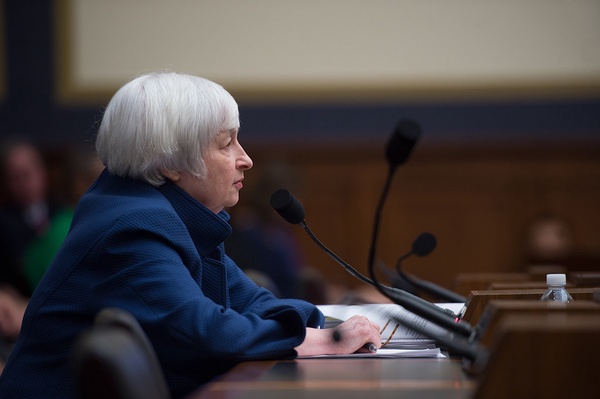During Janet Yellen’s confirmation hearing to become Secretary of the Treasury, she promised to “look to appoint someone at a very senior level” to lead the Treasury’s efforts on climate action.
As the newly-confirmed Secretary of the Treasury, Yellen could decide at any point to create this position with little commotion. She should do so without delay. This position should be titled something like the “Special Climate Envoy to the Secretary” to signify its close proximity to the Secretary, and ideally that person would lead a “hub” with several staff.
We and others have previously written about the many powers the Treasury Department possesses to shift capital away from causing climate carnage — everything from requiring climate stress tests to ensuring climate risk is considered in investment decisions, increasing capital requirements, and enacting policy which coincides with and supports the fossil fuel divestment movement. Yellen will have her hands full over the next four years, and desperately needs someone with sufficient expertise and command of the role to lead the fight.
Importantly, this new job should not just produce reports every so often acknowledging the ever-growing climate destruction encouraged by the federal government. For this position to be worthwhile, it must actually have authority within the Treasury Department, and be privy to the inner workings of its activities.
One of the main roles of this job should be convening and liaising with various regulatory agencies, the Domestic and Foreign Climate Czars, and any counterparts (or similar positions) globally. While the Treasury Department has a great deal of power on its own, the reality is that it exists within an ecosystem including dozens of other domestic financial regulatory actors who will have greater influence acting in harmony with one another than in a disconnected state. The Biden administration appears to recognize this, promising a “whole-of-government approach” to addressing the climate emergency.
To this end, Biden established two interagency groups by executive order last Wednesday. The Interagency Working Group on Coal and Power Plant Communities and Economic Revitalization, to which the Treasury Department was a named party, is responsible for coordinating federal resources to revitalize communities economically dependent on coal and power plant jobs. Biden also established a White House Environmental Justice Interagency Council; Treasury is not yet a listed member, which Yellen should urgently advocate to change. A Special Climate Envoy to the Treasury Secretary would be responsible for representing the Treasury Department on these councils and advocating for the best possible climate solutions.
Time is of the essence in creating and hiring for this position, and not only because the climate emergency worsens by the day. With the 2021 United Nations Climate Change Conference occurring in Glasgow this November, the U.S. must be prepared to share its experience as a global leader in climate finance. Other countries will be more likely to follow suit if they see strong climate action from us. This Treasury position would be essential in supporting John Kerry, the new “Foreign Climate Czar,” and other foreign policy leaders, to lead strongly by example.
One potential candidate for the position is Sarah Bloom Raskin, a finance expert and climate leader. Many finance-focused climate activists have elevated her as their ideal pick; David Arkush of Public Citizen went as far as to say it was “hard to imagine who is a better fit for that job” as she would do it “extremely well — probably better than anyone else.”
It’s clear why environmental advocates — many of whom are increasingly focusing on the importance of financial supervision and regulation to fight climate change — would feel this way. Raskin was previously Deputy Secretary of the Treasury, on the Federal Reserve Board of Governors, and a Financial Regulation Commissioner in Maryland. Over the last year, she has urged financial regulators through committee hearings, public writing, and panel speeches to address the climate emergency. She has come forward with a slew of specific ideas about how to insulate the financial system from climate risk and has insisted that 2021 is the year to “reimagine capital as a tool for accelerating and smoothing the transition to a world of net-zero carbon emissions.”
Raskin has not only proposed ensuring financial markets measure and disclose climate risk. She has taken that now-common belief one step further by insisting the Fed should use that data to make decisions on asset purchases and allocate capital to companies solving climate problems “rather than doubling down on harmful technologies that are destined for obsolescence.” This is in contrast to the nearly $100 billion the Fed doled out to fossil fuel companies this spring as part of a pandemic relief package, which arguably saved the industry from an otherwise inevitable downfall. She has also suggested providing capital to those most affected by climate change by encouraging more flexible and low-cost lending to credit unions and development institutions.
Raskin also wrote about the disturbing trend of major financial firms like BlackRock becoming “agents of the Fed,” and called for transparency “as decision-making moves further outside the realm of democratic accountability.”
All of this is to say that Raskin, in the words of the American Prospect’s Robert Kuttner, combines “progressive values with an astute technical knowledge” of the Treasury Department and Federal Reserve. A closer look into her time in public service shows she was a “major force for unconventionally progressive thinking on regulatory and monetary issues.” Raskin exemplifies the attitude this administration desperately needs: addressing the climate emergency creatively, and at the scale the crisis demands.
Regardless of the person who takes on this challenge, it is of the utmost importance that Yellen moves forward immediately to create a Special Climate Envoy position and empowers it with real decision-making authority across the Treasury’s lines of business. The power is there and it would be unconscionable not to use it.
Photo: “Chair Yellen delivers the semiannual Monetary Policy Report to Congress: _D4A3275” by Federalreserve is marked with CC PDM 1.0

